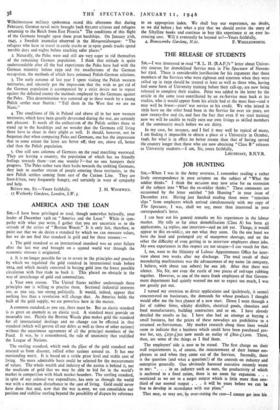AMERICA AND THE LOAN s111,--i have been privileged to read,
though somewhat belatedly, your leader of December 14th on "America and the Loan." While in sym- pathy with what you write, I gather that you are uncertain as to the attitude of the critics of "Bretton Woods." It is only fair, therefore, to point out that we do desire a standard by which we can measure values, but we do not find that standard in gold and for these reasons :—
r. The gold standard as an international standard was an utter failure after the last war and brought on a sscond world war through the economic stresses it originated.
2. It is no longer possible for us to revert to the principles and practice by which we regulated the gold standard in international trade before 1914, and which mainly consisted in forcing gold into the freest possible circulation with free trade to back it. This placed no obstacle in the way of interchange of gold and commodities.
3. Your own reason. The United States neither understands these principles nor is willing to practise them. Sectional industrial interests are, as you say, too strong politically. It would, indeed, appear that nothing less than a revolution will change that. As America holds the bulk of the gold supply, we are powerless here in the matter.
A common standard, as you say, there must be. But an elastic standard is as great an anomaly as an elastic yard. A standard must provide an invariable test. Plainly the Bretton Woods plan makes gold the standard for all international dealings and no change can be effected in that standard (which will govern all our debts as well as those of other nations) without the unanimous agreement of all the principal members of the Fund. It was, be it remembered, the rule of unanimity that stultified the League of Nations.
The sterling standard, which took the pace of the gold standard and rescued us from disaster, rallied other nations around us. It has one outstanding merit. It is based on a stable price level and stable cost of living. No more admirable basis could be selected for the measurement of values. The whole wealth and industry of the nation is behind it, not the modicum of gold that we may be able to bid for in the world's market in competition with black market hoarders. The sterling standard, in spite of our colossal war expenditure, has seen us through the world war with a minimum disturbance to the cost of living. Gold could never have done that and, now that the war is..over, we can consolidate our position and stabilise sterling beyond the possibility of dispute by reference to an appropriate index. We shall buy our experience, no doubt, as we did before ; but what a pity that we should revive the story of the Sibylline books and continue to buy this experience at an ever in- creasing cost. Will it eventually be beyond us?—Yours faithfully,






























 Previous page
Previous page